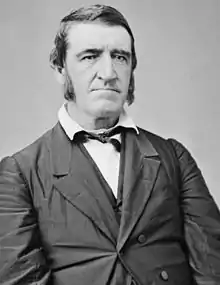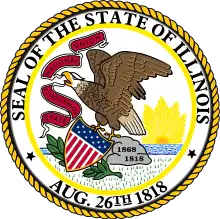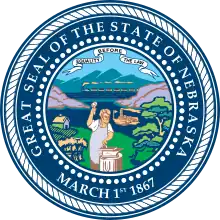William Alexander Richardson
William Alexander Richardson (January 16, 1811 – December 27, 1875) was a prominent Illinois Democratic politician before and during the American Civil War.
William Alexander Richardson | |
|---|---|
 | |
| United States Senator from Illinois | |
| In office January 12, 1863 – March 3, 1865 | |
| Preceded by | Orville H. Browning |
| Succeeded by | Richard Yates |
| 5th Governor of Nebraska Territory | |
| In office January 12, 1858 – December 5, 1858 | |
| President | James Buchanan |
| Preceded by | Thomas B. Cuming |
| Succeeded by | Julius Sterling Morton |
| Member of the U.S. House of Representatives from Illinois's 5th district | |
| In office March 4, 1861 – January 12, 1863 | |
| Preceded by | Isaac N. Morris |
| Succeeded by | Owen Lovejoy |
| In office December 6, 1847 – August 25, 1856 | |
| Preceded by | Stephen A. Douglas |
| Succeeded by | Jacob C. Davis |
| 12th Speaker of the Illinois House of Representatives | |
| In office December 5, 1842 – December 2, 1844 | |
| Preceded by | Samuel Hackleton |
| Succeeded by | Newton Cloud |
| Member of the Illinois Senate | |
| In office 1838-1842 | |
| Member of the Illinois House of Representatives | |
| In office 1836–1838 1844–1846 | |
| Personal details | |
| Born | January 16, 1811 Lexington, Kentucky, US |
| Died | December 27, 1875 (aged 64) Quincy, Illinois, US |
| Political party | Democratic |
| Alma mater | Centre College Transylvania University |
| Profession | Politician, Lawyer |
| Military service | |
| Branch/service | United States Army |
| Rank | Major |
| Battles/wars | Mexican–American War |
Born near Lexington, Kentucky, Richardson attended Transylvania University, and then proceeded to teach school and study law. He passed the bar exam in 1831 and started his practice in Shelbyville, Illinois. He was an attorney for the state from 1834 to 1835, and was elected representative to the state house, serving from 1836 to 1838. He moved over to the state senate from 1838 to 1842, and then back to the house again from 1844 to 1846, briefly serving as speaker of the lower house during his last term. He was a presidential elector in 1844 for successful Democratic nominee James K. Polk.
Biography
Richardson enlisted as a captain in the U.S. Army during the Mexican–American War, and was promoted to the rank of major. After the war, he moved to Quincy, Illinois, and then was elected a U.S congressman to the 30th Congress to fill Stephen A. Douglas's seat. He was then reelected to the 31st, 32nd, 33rd, and 34th Congresses for the same seat (1847 to 1856).
During his time in the House of Representatives, he was the Chairman of the Committee on Territories (32nd–33rd Congresses). He resigned in August 1856 to run for Governor of Illinois, narrowly losing to fellow representative, and first nominee of the newly established Republican Party, William H. Bissell. Richardson carried most of south Illinois while Bissell won most of north Illinois. Bissell won by 4,697 votes, a margin of just under 2%.[1]
After being defeated, Richardson was appointed by President James Buchanan as the Governor of the Nebraska Territory for most of 1858. Richardson resigned near the end of the year, remaining loyal to his political mentor, Stephen A. Douglas.
He was a delegate to 1860 Democratic National Convention from Illinois. He then came back to Washington D.C. as a member of the 37th Congress in 1861. In 1863, he was elected to fill Stephen Douglas's old seat in the United States Senate, defeating incumbent Republican Orville Browning. He was not renominated in 1865 and spent the rest of his life engaged in newspaper work.
He died on December 27, 1875, in Quincy, Illinois, where he is buried.
Richardson County, Nebraska, is named after him.
References
- "Our Campaigns - IL Governor Race - Nov 04, 1856". www.ourcampaigns.com. Retrieved March 5, 2021.
Sources
- "Richardson, William Alexander". The Political Graveyard. Retrieved January 10, 2006.
- "Richardson, William Alexander". Biographical Directory of the United States Congress. Retrieved January 10, 2006.
- This article incorporates facts obtained from: Lawrence Kestenbaum, The Political Graveyard
 This article incorporates public domain material from the Biographical Directory of the United States Congress.
This article incorporates public domain material from the Biographical Directory of the United States Congress.


